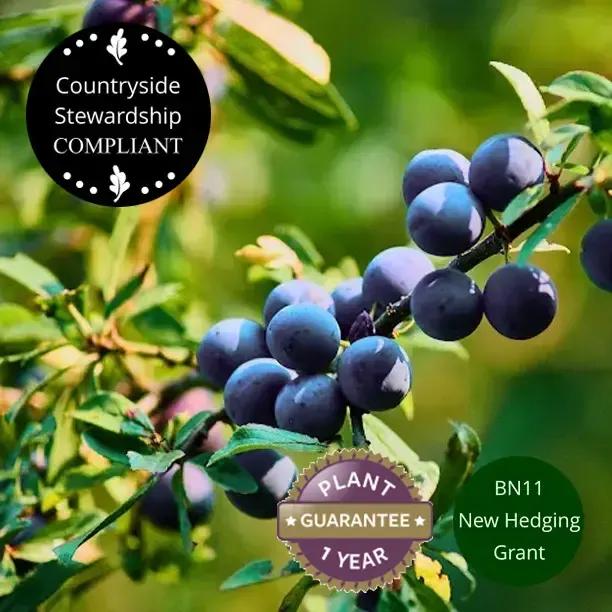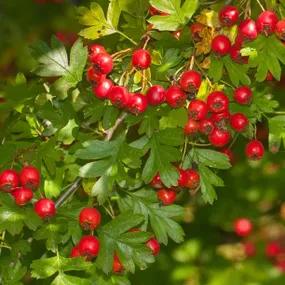Native Conservation Hedge Collection
Honest Delivery PricesConservation Hedging Collection
- Bundles of 50 plants with 6 Species.
- Native. 50% Hawthorn
- Qualifies for Countryside Stewardship Grants.
- Excellent for wildlife
- Any soil except waterlogged.
- 1 pack = 16m of single row / 8m of double row hedge
- Bareroot Delivery Only: Nov-Mar
Recommended extras
Description
Mixed Native Wildlife Conservation Hedging for Biodiversity
Our Conservation hedging pack is a bundle of 50 plants made up of 6 native species, with a Hawthorn base, which is the most popular base for hedges in most of Britain.
- A Blackthorn base is preferred in some areas. It's traditional for sheep enclosures, and may be better for bees.
- For large livestock, horses and cows, our blackthorn free stock-friendly mix is extra safe.
This conservation hedge pack exceeds the minimum requirements for grant-aided planting, such as BN11: Planting New Hedges: our Countryside Stewardship hedge pack with only two native species is the cheapest that qualifies.
Conservation hedging:
- Is ideal for all thorny country hedges (use our stock-friendly mix around horses & cows)
- Goes that extra step to support diverse wildlife
- More than qualifies for Countryside Stewardship grants (e.g. BN11: Planting New Hedges)
We will choose the plants that go into the hedge mix from the following list, which may change between the time of ordering and the time of despatch.
We cannot accept requests for specific plants to be used in your pack.
To be certain of having a particular plant in your hedge mix, please order it separately.
- 50% Hawthorn
- 10% each of 5 other native species (chosen by us): Blackthorn, Crab Apple, Dog Rose, Common Dogwood, Field Maple, Guelder Rose, Hazel, Spindle, Sweet Briar Rose or Wayfaring Tree.
This pack is made up of tough native plants that will grow almost anywhere.
It is perfect for supporting wildlife and increasing bio diversity.
More than half the plants in each bundle will be thorny.
Conservation hedge packs are only delivered bareroot, during winter (November - March).
The plants in this pack will be either 60-80cm or 90/120cm tall when we deliver them.
All our hedge plants are measured by their height in centimetres above the ground (the roots aren't measured).
For most projects, we recommend using the smaller, 60-80cm size hedge pack.
Use the larger plants if you are in a hurry to get a mature hedge, or are filling gaps in one.
View our selection of hedging packs or see our full range of hedging options.
Please note: when you receive our mixed hedging packs, they will not be already mixed and will be bunched by plant species.
Please remember to mix them for best results.
Spacing a Conservation hedge:
You can plant conservation hedging at 3 plants per metre, 33cm apart.
However, to qualify for the BN11: Planting New Hedges Grant, you must plant at 6 plants per metre in a staggered double row, with 33cm between each plant along the row and 40cm between the rows.
Each pack of 50 plants will make 16m of single row, or 8m of double row hedge.
Elderflower is excellent for wildlife, and it is fine to plant right at the end of a hedge row where it can grow away from its neighbour. We don't include it in hedge mixes because it's a bit too aggressive.
Planting Instructions
Growing Native hedges:
Conservation hedging will grow well in pretty much any conditions. Decent soil drainage is preferable, but these plants will cope with occasional waterlogging. Most of these plants are happy in partial shade.
Prepare your site before planting:
The native hedge plants in this Conservation mix are very tough. The only essential preparation is to kill the weeds in a strip a metre wide along the planting site: improving the soil should not be necessary. If your soil is exceptionally poor and dry, then digging in some well rotted manure and/or compost is worthwhile.
Watch our video on how to plant a country hedge for full details.
Remember to water establishing plants during dry weather for at least a year after planting.
Hedge Planting Accessories:
Prepare your site for planting by killing the weeds and grass.
You can buy a hedge planting pack with sheets of mulch fabric and pegs to hold it down.
If you are planting in an area with rabbit and/or deer, you will need to use a plastic spiral guard for each plant, supported by a bamboo cane.
If your soil quality is poor, we recommend using mycorrhizal "friendly fungi" on the roots of new trees and shrubs.
You can also improve your soil with bonemeal organic fertiliser.
After you plant a hedge, the most important thing to do is water it in dry weather. If you didn't use mulch of some kind, you will also need to weed around the hedge. Both of these will be necessary for at least a year after planting.
Trimming Country hedge plants: Native hedging plants benefit from being cut back hard right after planting, as shown in the country hedge planting video. In the following years, your young hedge should be trimmed lightly once in winter, until it is mature. When it is fully grown, you can clip it at anytime.
Special notes on caring for Conservation hedges:
These are very tough plants that shouldn't need special attention once they have established. If you didn't use a mulch fabric, it is beneficial to mulch around the base of the hedge each year with well rotted manure or compost.
Hygiene & Diseases:
Dead, damaged or diseased wood can be pruned off as soon as it appears.
Disinfect your pruning tools between every cut if there is any sign of disease.
Burn or dispose of any diseased material, do not compost it.




